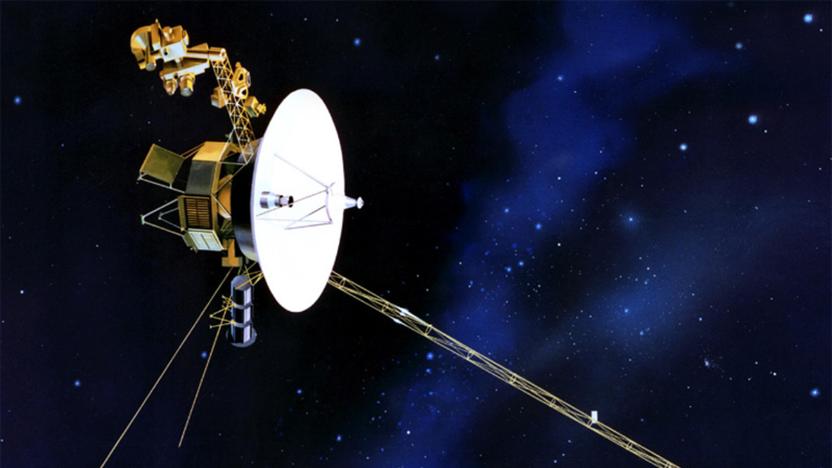cosmic rays
Latest

Voyager probes detect a new form of cosmic ray burst from the Sun
The Voyager 1 and 2 probes have detected a new kind of cosmic ray electron burst emanating from the Sun, decades after they started their missions.

Radio astronomy pioneer Sir Bernard Lovell dies at 98
Astronomy just lost one of its vanguards, as Sir Bernard Lovell has died at 98. The UK-born scientist was best known as a cornerstone of radio telescope development. While he wasn't the first to leap into the field, he established the University of Manchester's Jodrell Bank Observatory to study cosmic rays in 1945 and organized the construction of what would ultimately be called the Lovell Telescope -- a radio telescope so large and useful that it's still the third-largest steerable example in the world, 55 years after it was first put into action. His work helped track some of the earliest spacecraft and was instrumental in confirming the first discovered pulsars and quasars. On top of his most conspicuous achievements, Sir Lovell played an important role in developing airborne radar during World War II and was lauded for having scientific curiosity long after he hung up his Jodrell director's hat in 1980. Science will be poorer without him. [Image credit: NASA; thanks, Darren]

$2 billion antimatter detector to go on last shuttle mission, taxpayers agree it better find -something
The airspace above the Atlantic Ocean will get a lot more expensive tomorrow as a U.S. Airforce Galaxy jet transports the Alpha Magnetic Spectrometer -- developed at CERN -- from Geneva to the Kennedy Space Center in Florida. The last-ever Space Shuttle mission in February will transport the AMS to the International Space Station, where it will stay docked for 20 years to "search for antimatter and dark matter by measuring cosmic rays." We're not sure what that means, but we trust it will lead to a microwave that heats the interior of our Hot Pockets while keeping the crust crisp and flaky, bringing us one step closer to World Peace.[Image credit: US Mission Geneva's flickr]

Intel patents cosmic ray detectors on-a-chip. What a relief.
That great perpetrator of worldly ills, the cosmic ray, has at last met its match. Intel has patented the concept of an on-chip detector of cosmic rays which would auto-correct for soft errors caused by the cosmic ray's interference. Apparently Intel is concerned that cosmic rays -- those perky particles from space that blast through the Earth's atmosphere and tamper with your precious bodily fluids -- are going to become "a major limiter of computer reliability in the next decade" as chips get smaller and smaller. The rays have already been proved to interfere with electronics in small ways, so while Intel doesn't have method for building an actual cosmic ray detector yet, they're certainly getting a jump on the problem with this patent. We know we'll certainly be sleeping better at night.[Via Slashdot]


